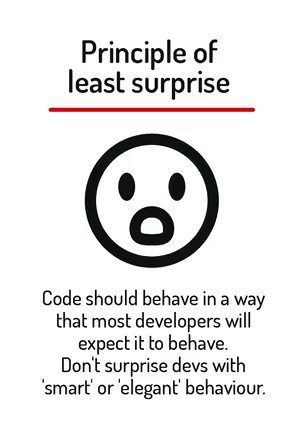Principle of least surprise

The principle of least surprise is simple: code should do what a reasonable developer expects it to do. Avoid clever tricks that save a few lines but confuse anyone reading or maintaining your code. Surprise is the enemy of maintainability. If you or a teammate open the code six months later, it should feel familiar and predictable.
In practice, this means naming things clearly, following conventions, and preferring explicitness over implicit magic. A method should do what its name suggests, a class should have a single, clear responsibility, and side effects should be obvious.
For example, this surprises most developers:
public class UserService {
public User findUser(String id) {
return Optional.ofNullable(database.get(id)).orElseGet(() -> new User("default"));
}
}A developer might expect findUser to return null or throw if the user doesn’t exist. Returning a default silently can lead to subtle bugs. A more predictable approach is explicit:
public class UserService {
public Optional<User> findUser(String id) {
return Optional.ofNullable(database.get(id));
}
}Now it’s clear: handle the absence explicitly.
Other practical habits:
-
Avoid overloading operators or using inheritance in confusing ways.
-
Stick to standard patterns and library conventions.
-
Make method contracts and return values explicit.
Every time you commit, ask: “If another dev reads this, will it do exactly what they expect?” If the answer is no, rethink it. Predictable code reduces bugs, eases debugging, and makes the codebase a joy to work in. The principle of least surprise is about empathy: coding for the next developer who will touch your code, which is often future you.